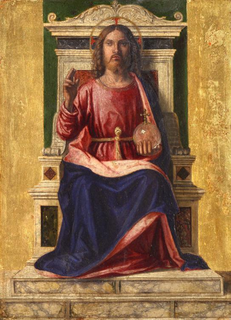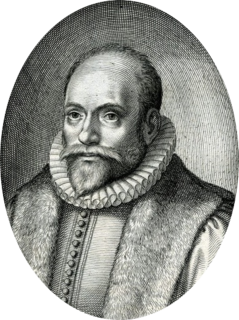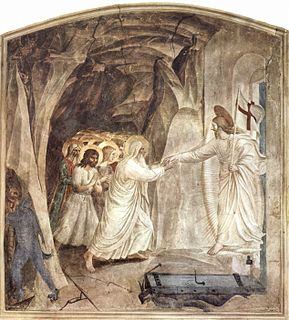Catholic theology
Synergism, the teaching that there is "a kind of interplay between human freedom and divine grace", is an important part of the salvation theology of the Catholic Church. [8]

The Catholic Church, also known as the Roman Catholic Church, is the largest Christian church, with approximately 1.3 billion baptised Catholics worldwide as of 2016. As the world's "oldest continuously functioning international institution", it has played a prominent role in the history and development of Western civilisation. The church is headed by the Bishop of Rome, known as the Pope. Its central administration, the Holy See, is in the Vatican City, an enclave within the city of Rome in Italy.
The Catholic Church rejects the notion of total depravity: they hold that, even after the Fall, man remains free, and human nature, though wounded in the natural powers proper to it, has not been totally corrupted. [9] In addition, they reject the idea that would "make everything the work of an all-powerful divine grace which arbitrarily selected some to be saved and some to be damned, so that we human beings had no freedom of choice about our eternal fate". [10]
The Catholic Church also teaches that the ability of the human will to respond to divine grace is itself conferred by grace. "By the working of grace the Holy Spirit educates us in spiritual freedom in order to make us free collaborators in his work in the Church and in the world". [11] "The preparation of man for the reception of grace is already a work of grace." [12] "When Catholics say that persons 'cooperate' in preparing for and accepting justification by consenting to God's justifying action, they see such personal consent as itself an effect of grace, not as an action arising from innate human abilities." [13] "When God touches man's heart through the illumination of the Holy Spirit, man himself is not inactive while receiving that inspiration, since he could reject it; and yet, without God's grace, he cannot by his own free will move himself toward justice in God's sight." [14]
Eastern Orthodox theology
James R. Payton discusses the Eastern Orthodox view of the synergism vs monergism debate as follows: [15]
A distinctive element in the Orthodox understanding of how the Holy Spirit works deification within us is the doctrine of "synergy"--"working together." This working together is the collaboration of God's grace and a person's will. While Western Christianity has argued about the alternatives of "monergism" and "synergism"--that is, the question of whether salvation is accomplished only by God or by God and human beings cooperating--this issue did not become a tension within Orthodoxy. Eastern Christendom has not focused on the issues of guilt, debt, questions of merit and so on, that flowed from the juridical approach of the Christian West and made the monergism/synergism issue a matter of concern. Orthodoxy insists on synergy, but Orthodox teaching approaches the question of divine grace and human will working together from quite a different perspective. [15]
The Eastern Orthodox view of synergism holds that "humans beings always have the freedom to choose, in their personal (gnomic) wills, whether to walk with God or turn from Him", but "what God does is incomparably more important than what we humans do". [15]
"To describe the relation between the grace of God and human freedom, Orthodoxy uses the term cooperation or synergy (synergeia); in Paul's words, 'We are fellow-workers (synergoi) with God' (1 Corinthians iii, 9). If we are to achieve full fellowship with God, we cannot do so without God's help, yet we must also play our own part: we humans as well as God must make our contribution to the common work, although what God does is of immeasurably greater importance than what we do." [16] "For the regenerated to do spiritual good — for the works of the believer being contributory to salvation and wrought by supernatural grace are properly called spiritual — it is necessary that he be guided and prevented [preceded] by grace." [17]
Arminian Protestants share this understanding of synergism, i.e., regeneration as the fruit of free will's cooperation with grace. [1]
Lutheranism
Lutheranism describes its soteriological position as a monergistic salvation and a synergistic damnation. By monergistic salvation, Lutherans mean that saving faith is the work of the Holy Spirit alone, while man is still the uncooperative enemy of God (Rom. 5:8,10). To support their understanding of synergistic damnation, they argue that Scripture states repeatedly that man participates in and bears the responsibility for resisting God's grace of the free gift - not enforced gift - of salvation (ex: Matt. 23:37, Heb. 12:25, Acts 7:51, John 16:9, Heb. 12:15, etc.). Lutherans understand their view to be in contrast to Calvin's monergistic damnation and to Arminius' synergistic salvation; however, Calvinists would take issue with their view being called "monergistic damnation," since they claim to agree with Lutherans and Arminians that mankind alone bears responsibility for their sin and for their rejection of God's world-wide call to repent and be saved.
The difference Lutheranism has with Calvinism and Arminianism, then, lies in how they describe the workings of God's will, foreordination, and gracious providence. Lutheranism teaches that God predestines some to salvation but does not predestine others to damnation as God wills that all might be saved (1 Tim 2:3-6, Rom. 11:32, etc.). This differs from the Calvinist and Arminian view that God from eternity actively decrees some to salvation and some to damnation, with Arminians understanding that God bases his eternal decree upon his foreknowledge of men's synergistic acceptance or rejection of salvation, and with Calvinists arguing that God's predestination logically precedes his foreknowledge of it. For Lutherans, people freely reject God's call to salvation because they refuse his grace since God did not predestine them to salvation; for Arminians, people freely reject God's call to salvation because God decrees, based upon his foreknowledge, that they will reject his grace; for Calvinists, people freely reject God's call to salvation because God eternally chooses not to place his saving grace upon them so as to magnify the value of his undeserved grace to those whom he does choose.
The Lutheran argument for the Scriptural basis of man's justification by faith alone is summarized in the Epitome of the Formula of Concord under Free Will and The Righteousness of Faith, and fully discussed in the Solid Declaration of the Formula of Concord under Free Will and The Righteousness of Faith. Likewise the Defense of the Augsburg Confession discusses the Scriptural basis of man's Justification. Thus, Calvinists incorrectly accuse Lutherans of Arminianism and Arminians incorrectly accuse Lutherans of Calvinism. Lutherans view their stance not as having one foot in Calvinism and one foot in Arminianism, but having both feet firmly planted in scripture.
Arminian Protestantism
Christians who hold to Arminian theology, such as Methodists, believe that salvation is achieved through "divine/human cooperation", which is referred to as synergism. [18]
Calvinists frequently use the term "synergism" to describe the Arminian doctrine of salvation. According to Calvinists, synergism is the view that God and man work together, each contributing their part to accomplish regeneration in and for the individual. John Hendryx, a Calvinist theologian, has stated it this way: synergism is "...the doctrine that there are two efficient agents in regeneration, namely the human will and the divine Spirit, which, in the strict sense of the term, cooperate. This theory accordingly holds that the soul has not lost in the fall all inclination toward holiness, nor all power to seek for it under the influence of ordinary motives." [19] Arminians of the classical and Wesleyan traditions would respond with the criticism that Hendryx has merely provided a description of the heresy of semi-Pelagianism, and they recognize that grace precedes any cooperation of the human soul with the saving power of God.
In other words, God has offered salvation, and man must receive it. This is opposed to the monergistic view as held by Reformed or Calvinistic groups in which objects of God's election participate in, but do not contribute to, the salvific or regenerative processes. Classical Arminians and most Wesleyans would consider this a straw man description, as they have historically affirmed the Reformed doctrine of total depravity. To this, Hendryx replies by asking the following question: "If two persons receive prevenient grace and only one believes the gospel, why does one believe in Christ and not the other? What makes the two persons to differ? Jesus Christ or something else? And that 'something else' is why Calvinists believe Arminians and other non-Augustinian groups to be synergists." Regeneration, in this case, would occur only when the unregenerate will cooperates with God's Spirit to effectuate redemption. To the monergist, faith does not proceed from our unregenerate human nature. If faith precedes regeneration, as it does in Arminianism, then the unregenerate person must exercise faith in order to be regenerated.
One must understand, however, what the doctrine of prevenient grace actually teaches. Arminians are in agreement with the monergist with respect to the prior necessity of grace for regeneration; strictly speaking, at no time have Arminian theologians, classical or Wesleyan, argued that faith proceeds from the unregenerate (that is, a totally natural or graceless) human nature. John Wesley expressed this himself, saying, "The will of man is by nature free only to evil. Yet... every man has a measure of free-will restored to him by grace." [20] "Natural free-will in the present state of mankind, I do not understand: I only assert, that there is a measure of free-will supernaturally restored to every man, together with that supernatural light which 'enlightens every man that comes into the world.'" [21] "This is not a statement about natural ability, or about nature as such working of itself, but about grace working through nature." [22]
Arminians, therefore, hold a position which may be summarized in the following way: a human being cannot, on his or her own, turn to God. God grants all sinners prevenient grace (prevenient meaning "coming before"). With this prevenient grace (or with its effects on the fallen human), a person is able to freely choose to place faith in Christ or reject his salvation. If the person accepts it, then God justifies him and continues to give further grace to spiritually heal and sanctify him. In response to Hendryx's question about the two individuals receiving prevenient grace and only one being saved, the Arminian would reply that the one who was saved freely chose faith, but only had the power to choose faith because of the prevenient grace, whereas the one who was not saved had the same assistance from prevenient grace and thus the same ability to choose, but freely chose not to have faith. Whether this is characterized as synergy will depend upon one's definition. It differs, however, from semi-Pelagianism, which maintains that a human being can begin to have faith without the need for grace. [23] In addition, the Arminian might say that the person's decision is not the cause of his salvation or loss, but rather that his free response to prevenient grace forms the grounds for God's free decision; the person's decision does not constrain God, but God takes it into consideration when He decides whether to complete the person's salvation or not. An analogy may be seen in that when Angela offers to pay off a loan for Brian, Angela offers freely. If Brian declines, Angela could still choose to pay off the loan (in theory), and if Brian consents, Angela is still not constrained to pay it off. Rather, Brian's response informs Angela's decision to either settle or not settle the loan. In like manner, God takes the person's response to the gospel, empowered by prevenient grace, into account as relevant information when freely choosing whether or not to save that person. Therefore, the person's choice does not work alongside God. For this reason, many Arminians do not view the term synergism as an accurate description of their theology.
Another analogy sometimes cited is based upon Revelation chapter 3, in which Christ states that he stands at the door and knocks, and if anyone opens he will enter in. Arminians assert that Christ comes to each person with prevenient grace, and if they are willing for him to enter, he enters them. Therefore, no one does any of the actual work of saving themselves, because Christ does the work of coming to them in the first place, and if they are willing to follow him, he does the work of entering in, but whether he does so is dependent upon the will of the person (no one, however, could will for him to enter if He did not first knock).
This is similar to the position taken in the Conferences of John Cassian. [24] In this work, the matter of grace and faith is taken as analogous to that of the invalids that Christ healed. That Christ met the ill persons where they were is likened to prevenient grace because unless Christ went to them, the invalids would have had no opportunity to ask him for help. Likewise, without prevenient grace no sinner would be able to ask God for help. The actual asking for help comes from the free choice of the invalid or person in question. It is made possible by Christ's presence (by prevenient grace), but there is no necessary outcome: Christ's presence (prevenient grace) leaves a person able to ask for help, but also able to refuse to ask for help. Asking, however, does not accomplish anything to actually heal the person; Christ's response to their request is what heals them, not their own choice. Likewise, God saves those who ask Him. However, they are only able to ask because He first comes to them with prevenient grace. Nonetheless, they are free to refuse to ask for His help, just as the invalids were free to not ask Christ for healing. Thus it is concluded, "it belongs to divine grace to give us opportunities of salvation... it is ours to follow up the blessings which God gives us with earnestness or indifference." God is then free to decide how to respond to our earnestness or indifference, which make up a part of the data which He considers in His free decision. We know, however, that in love He will respond by completing the salvation of those who respond earnestly, while leaving those who respond with indifference to their own devices.
In the 13th Conference, Cassian also uses the analogy of a farmer. Although the farmer must choose to work the farm, the growth of his crops is entirely due to God. God provides the growth, but He does so only for those who are willing to have that growth and actualize this through their effort.











